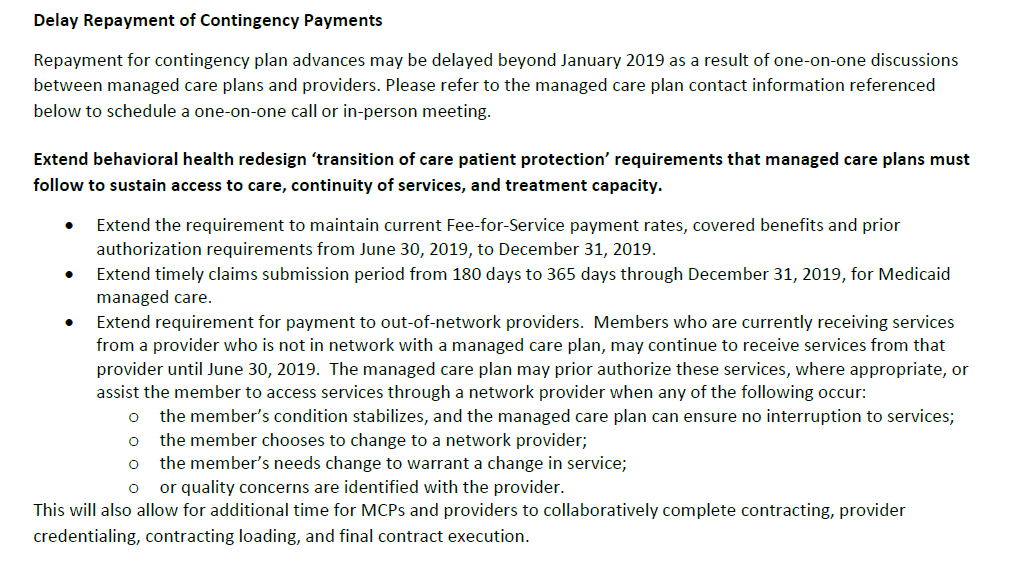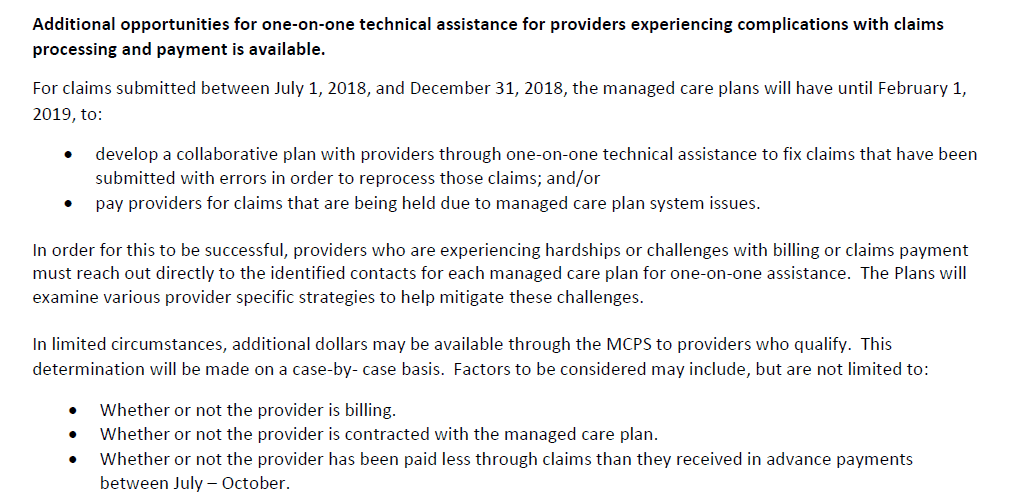Posted by Behavioral Health Billing Solutions, LLC.

The transition to Managed Care for Behavioral Health Providers in Ohio has been in place for over 6 months now.
Time for an Update on the status of Behavioral Health in Ohio.
The Ohio Department of Medicaid recently released some of their plans to provide relief to providers experiencing cash flow issues during this transitional period. The full MITS BITS is available here.
My goal today is to address the current issues still being experienced and provide insight on the various pieces of recommended relief for providers.
To begin, I’d like to state some of the current issues BHBS is seeing with our clients.
1. Incorrect short payments from all MCO’s for supervised and licensed services.
The error code you will receive can actually be several and are listed below. They are usually accompanied by a CO45 adjustment code.
“N381 – Alert: Consult our contractual agreement for restrictions/billing/payment information related to these charges.”
“N10 – Adjustment based on the findings of a review organization/professional consult/manual adjudication/medical advisor/dental advisor/peer review.”
“N524 – Based on policy this payment constitutes payment in full.”
This is a “known issue” with the MCO’s and to date, I have not received a resolution date. I also have asked if we need to submit these issues as they occur or will they just reprocess. The answer is continue to submit these issues, if you are able to identify, and once the issue is resolved, they will let providers know how the corrective process will work. This happens every week on every payment and is an administrative strain to continually track and report these short pays.
2. Incorrect denials for provider type. The error code is:
“N95 Provider not eligible to provide service”.
I’ve verified the denials I’m seeing are for the correct service, under the correct billing NPI, service provided by a qualified, registered provider.
3. Short payments for all SUD case management and CPST. For some reason, they are regularly paying half of the billed service. The error code is:
“N10 – Adjustment based on the findings of a review organization/professional consult/manual adjudication/medical advisor/dental advisor/peer review.”
4. Incorrect processing of add-on codes. Also, a “known issue”. Sometimes, they pay the primary and deny the add-on codes, sometimes they pay the add-on code and deny the primary. The error codes for this include:
“N524 – Based on policy this payment constitutes payment in full.”
M15 – Separately billed services/tests have been bundled as they are considered components of the same procedure. Separate payment is not allowed.”
6. Incorrect denials for procedure/modifier combo for U3 and U6. The error code is:
“N56 – Procedure code billed is not correct/valid for the services billed or the date of service billed.”
All MCO’s say modifiers are optional and many providers have decided to continue sending rather than restructuring their entire software. In most cases, this has been fine. This denial is relatively new and seems limited to CareSource so far.
7. This week, an issue that was resolved months ago reappeared. CareSource and Paramount are once again denying HCPC codes for clients with insurance. This was discovered on remits from the end of December. Keep in mind, we are not required to bill certain codes to insurance. The crosswalk is available here. The error code is:
“N4 – Missing/Incomplete/Invalid prior Insurance Carrier(s) EOB.”
The adjustment code listed is “22 – This care may be covered by another payer per coordination of benefits.”
8. Requiring TPL for Clients with insurance for ALL provider types including Medicare Supplement plans and providers that can’t be credentialed with insurance.
Since there is not sufficient coordination between the plans and ODM on insurance coverage, each MCO is processing differently. The issue of requiring adjudication of claims for clients with insurance for ALL provider types, even those that cannot be credentialed with insurance has been problematic since put in place in January. In addition, ODM is incorrectly including Medicare supplement plans in this adjudication even though these plans follow the same guidelines as Medicare and will not pay for most provider types. This is in direct opposition to the national guideline for Medicare claims.
So, as we know, these problems, in conjunction with the massive provider requirements that changed as of July 1st, has resulted in significant cash flow issues, agencies laying off providers and cutting out needed programs, agencies going out of business and an overall instability in Behavioral Health in Ohio.
In response to these issues, there have been multiple, ongoing discussions with state representatives, the MCO’s and the Ohio Department of Medicaid and OhioMAS. ODM has recently announced some steps they are taking to assist.

The ability to negotiate a delay in repayment individually with the MCO’s is helpful, but not enough. The extension of current fee-for-service rates through December 31st, 2019 is reassuring.
The timely filing extension from 180 to 365 days is appropriate, especially considering the current, ongoing claim processing issues being experienced by claims submitted to the MCO’s.
Extending requirements of payments to out-of-network providers is a step in the right direction but pay attention to the part where it states prior authorization may be required if you are out of network.

This part is interesting. Although the MCO’s have the timeline of February 1st, 2019 to work with providers to provide technical assistance or pay for claims being held due to MCO system issues, the overall responsibility lays with the provider to reach out.
For our clients at BHBS, they have someone to assist with identifying and reporting issues, my concern is whether or not the average agency has the ability to identify and report these issues.
I do appreciate the fact that the MCO’s will consider additional contingency payments to providers who qualify but pay attention to the bullet points of who will or will not qualify for these.


The part related to concessions addressing the new provider requirements is welcome news. It’s my understanding that the task force for provider enrollment has been more beneficial than others and I believe this concession is probably a result of that. However, if this is in place, why am I seeing denials for provider not allowed to provide service? When will this change be effective across the board?
As we move forward, BHBS continues to help as many agencies as we can by assisting them with identifying and reporting ongoing issues so they can be dealt with by each of the MCO’s.
My recommendation is that if your agency is experiencing issues, take the time and reach out to the MCO’s to discuss your problems. I would also recommend filing complaints when issues are not resolved timely. Unreported issues are part of the problem why ODM does not understand the impact these changes are having on agencies. Reporting issues should not impact your ability to successfully build relationships with the MCO’s moving forward but it will make ODM aware of the ongoing challenges.
